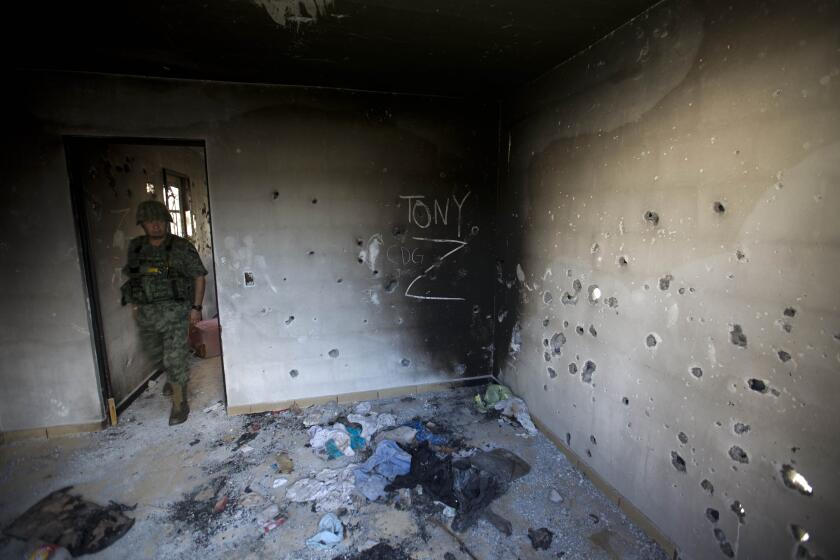Reagan Altered Story on Arms, Notes Indicate
WASHINGTON — President Reagan privately told aides last November that secret U.S. arms sales to Iran had helped shore up Iran’s “weaker” position in its war with Iraq, only to publicly assure the nation three days later that the sales had not tipped the war’s balance “in any way,” newly released notes of a key White House meeting indicate.
The handwritten notes were taken last Nov. 10 by former White House Chief of Staff Donald T. Regan during a discussion by the President and his top aides shortly after the arms sales became public.
They suggest that the military value of the Iran weapons shipments was a matter of confusion at top levels of the White House even after the arms sales--which sought the release of American hostages held by Iranian-supported terrorists in Lebanon--had been under way for 14 months.
Shultz Advice Ignored
At one point in the session, Regan’s records indicate, Secretary of State George P. Shultz counseled “caution on over-assertion that (the) arms shipments were small or inconsequential.” Reagan appears not to have followed the advice.
Congress’ Iran- contra investigative panels released the records during Regan’s testimony Thursday on Capitol Hill.
The 15 pages of Regan notes document a 95-minute meeting in which the President, Regan, Shultz, Vice President George Bush, CIA Director William J. Casey, Defense Secretary Caspar W. Weinberger, Atty. Gen. Edwin Meese III, former National Security Adviser John M. Poindexter and Poindexter deputy Alton G. Keel Jr. debated how to respond to public criticism of the newly disclosed Iran arms sales.
Midway in the session, the notes indicate, the President stated that the United States wished “to have things even” in the Iran-Iraq conflict, which then was entering its sixth year. U.S. arms sales during the preceding 14 months, Reagan said, had helped offset an Iraqi military edge.
“Side with mil(itary) superiority will win,” the notes quote Reagan as saying. “We want to have things even. This helps Iran, which was weaker.”
In a nationally televised speech three days later on Nov. 13, the President took the opposite position. In describing the total arms sales as small enough to “easily fit into a single cargo plane,” he said that the six shipments “could not, taken together, affect the outcome of the . . . war between Iran and Iraq. Nor could they affect in any way the military balance between the two countries.”
He repeated the assertions in a televised news conference six days later.
The White House since has admitted that the weapons in those shipments--2,008 TOW anti-tank missiles, plus Hawk anti-aircraft missiles and some spare Hawk parts--were far too large to fit into a single airplane.
The Administration has continued to state that the arms had no measurable impact on the Iran-Iraq war. Analysts agree that the weapons sales were tiny compared to the $2 billion to $4 billion in war materiel that Iran buys annually.
Experts differ on the arms’ strategic value, however. Some note that the TOWs helped counter the Iraqi army’s overwhelming numerical edge in tanks--a crucial element in a war waged almost wholly by foot soldiers.
Regan’s notes suggest that the White House itself was not certain of the weapons’ military value at the time the arms-for-hostage project began to unravel last fall.
Called Defensive Weapons
In a briefing at the start of the White House skull session, Regan’s notes indicate, Poindexter told the President and others that the arms shipped to Iran “are defensive weapons, are minimal amounts” sent as a gesture of good faith.
Casey echoed that view later, saying that the White House had “a good position” on the Iran disclosures if officials “deemphasize hostages (and) deny arms sales that they tip balance between Iran/Iraq,” according to the notes.
But Shultz, who earlier had warned against releasing information that was “technically correct” but misleading, cautioned against playing up the supposedly small size of the weapons shipments. A few minutes later, the President asserted that the arms had helped Iran overcome its weaker position in the war.
Nine months later, Regan’s notes on the session suggest that the White House bypassed the advice of the CIA and relied on Israel’s assessment of the Iran-Iraq conflict to justify the secret weapons sales.
Wants Debilitating Stalemate
Israel, which favors a debilitating stalemate in the war between its two enemies, had told the White House that Iran was losing the struggle and that a defeat might open that strategic nation to further radicalism and Soviet domination.
The U.S. view of the war, according to CIA analysts, was that Iraq’s huge edge in military equipment was fully offset by Iran’s advantage in both the size and fanaticism of its infantry. In congressional testimony, Poindexter acknowledged briefing Reagan on the Israeli view in mid-1985, when the arms sale plan was first conceived.
Poindexter said then that the United States shared the Israeli view of the war. But, under questioning by the congressional committees, he conceded that American experts had predicted that Iranian forces would overwhelm the Iraqis, only to decide later that the war was stalemated.
Iran Seen as Winning
More recently, military analysts have said that the course of the war is turning in Iran’s favor.
Regan’s record of the White House meeting shows considerable suspicion among Administration higher-ups of Israel’s motives as the Iran initiative began to fall apart.
Shultz reportedly stated that he believed Israel “suckered us into this so we can’t complain” about its program of secret arms sales to Iran. The Israelis, despite official U.S. objections, are believed to have been quietly selling arms to the regime of Ayatollah Ruhollah Khomeini for years.
At another point in the meeting, Weinberger is quoted as warning Reagan to “be careful of Raf (Hashemi Rafsanjani, the Speaker of Iran’s parliament) & Israel & blackmail.”
More to Read
Sign up for Essential California
The most important California stories and recommendations in your inbox every morning.
You may occasionally receive promotional content from the Los Angeles Times.










